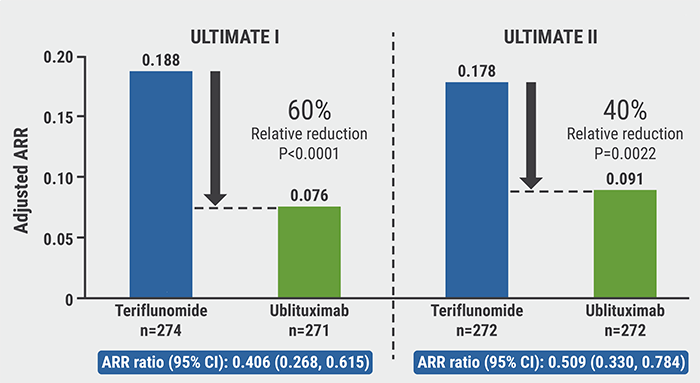Prof. Lawrence Steinman (Stanford University, CA, USA) presented the 96-week results of the identical phase 3, randomised, multicentre, double-blind ULTIMATE I (NCT03277261) and ULTIMATE II (NCT03277248) trials. Subjects with relapsing MS (n=549, n=545) were randomised 1:1 to 450 mg intravenous ublituximab every 24 weeks or 14 mg oral teriflunomide once daily. The primary endpoint was the annualised relapse rate (ARR) at week 96.
Ublituximab significantly reduced the ARR in the ULTIMATE I (59.4% reduction) and II (49.1% reduction) trials compared with teriflunomide. The relative reductions of contrast-enhancing T1 lesions for patients in the ublituximab arms were 96.7% and 96.5%, respectively, compared with teriflunomide. The relative reductions of new or enlarging T2 lesions were similar. In both trials, the proportion of patients who showed No Evidence of Disease Activity (NEDA) were higher in the ublituximab group (44.6%; 43.0%) than in the teriflunomide group (15.0%; 11.4%). Multiple Sclerosis Functional Composite (MSFC) scores showed patients benefited from ublituximab (0.469; 0.521) over teriflunomide (0.266; 0.275). A favourable safety and tolerability profile was observed for ublituximab. Any adverse events (AEs) were reported in approximately 88% of the patients, regardless of treatment. Infusion-related reactions, headache, and nasopharyngitis were the most frequently reported AEs in the ublituximab groups. Serious AEs, mainly infections and infestations, were observed in 9.5% of patients treated with ublituximab.
- Steinman L, et al. Phase 3 results of the ULTIMATE I & II global studies: ublituximab versus teriflunomide in relapsing multiple sclerosis. OP117, ECTRIMS 2021 Virtual Congress, 13–15 October.
Copyright ©2021 Medicom Medical Publishers
Posted on
Previous Article
« Dynamic scoring system aids decision to switch MS therapies early Next Article
Rituximab most effective initial MS therapy in Swedish real-world study »
« Dynamic scoring system aids decision to switch MS therapies early Next Article
Rituximab most effective initial MS therapy in Swedish real-world study »
Table of Contents: ECTRIMS 2021
Featured articles
Preliminary data shows positive results of ATA188 for progressive MS
COVID-19
MS patients at risk of hampered immune response after vaccination
Immunotherapy in MS does not influence COVID-19 severity and mortality
Anti-CD20 antibodies associated with worse COVID-19 outcomes
ECTRIMS-EAN consensus on vaccination in MS patients
Experimental Treatments
The role of astrocyte phenotypes in acute MS lesions
Promising results of intrathecal MSC-NTF cells in progressive MS
Preliminary data shows positive results of ATA188 for progressive MS
Evobrutinib reduces relapses and MRI lesion activity
Primary endpoint of opicinumab for relapsing MS not met in AFFINITY trial
Elezanumab did not outperform placebo in progressive and relapsing MS
Ibudilast reduced retinal atrophy in primary progressive MS
Treatment Trials and Strategies
ECTRIMS/EAN Clinical Guidelines on MS treatment: an update
Rituximab most effective initial MS therapy in Swedish real-world study
Ublituximab meets primary endpoint for relapsing MS
Dynamic scoring system aids decision to switch MS therapies early
Long-term suppression of MRI disease activity with ocrelizumab
Stopping DMT: when or if at all?
Biomarkers
Early predictors of disability progression in paediatric-onset MS
High-sensitive biomarker detection in MS via novel ELISA assay
Cortical lesions predict cognitive impairment 20 years after MS diagnosis
Applicability of sNfL measurement in clinical practice
MRI more sensitive for disease activity than relapses in SPMS
Imaging
Changes in GABA-receptor binding among cognitively impaired MS patients
T2 lesions independently predict early conversion to SPMS
Natural killer-like CD8+ T cells as a reservoir of clonal cells related to MS activity
Neuromyelitis Optica Spectrum Disorder (NMOSD)
Eculizumab, satralizumab, or inebilizumab for NMOSD?
Long-term efficacy of satralizumab for NMOSD
Long-term efficacy data: inebilizumab for NMOSD
Progressive MS
Charcot Award 2021: Progressive MS, a personal perspective
Top score poster: Meta-analysis on the effect of DMTs
Cortical lesions predict disease progression and disability accumulation
Ocrelizumab shows long-term benefits in primary progressive MS
Other
WNT9B-gene variant associated with doubled relapse risk in MS
Melatonin associated with improved sleep quality in MS patients
“Expanded Disability Status Scale 0 is not normal”
Personality trait alterations in MS patients
Related Articles
November 25, 2020
Safety and efficacy of dimethyl fumarate: 13 years of follow-up
December 15, 2022
REMIND-MS trial: initial results

June 16, 2021
Ublituximab versus teriflunomide in relapsing MS
© 2024 Medicom Medical Publishers. All rights reserved. Terms and Conditions | Privacy Policy

